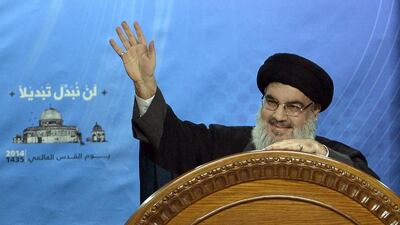Hassan Nasrallah, the leader of Hizbollah, has mocked United States sanctions targeting funding for his group. In a speech broadcast by Al Manar, the Shiite party’s television station in Lebanon, Mr Nasrallah said the sanctions would have no effect.
He said: “We do not have any business projects or investments via banks.”
Mr Nasrallah added that Hizbollah’s survival depends on Iran. “We are open about the fact that Hizbollah’s budget, its income, its expenses, everything it eats and drinks, its weapons and rockets, come from the Islamic Republic of Iran,” he said, stressing that his group “will not be affected” by any type of sanctions.
“As long as Iran has money, we have money … Just as we receive the rockets that we use to threaten Israel, we are receiving our money. No law will prevent us from receiving it.”
Hizbollah recently suffered significant losses in Syria, but Mr Nasrallah has vowed to continue the battle and send more fighters there.
Mr Nasrallah’s speech is the first time since Hizbollah’s inception that its leader has publicly confirmed the extent of the support it obtains from Iran, including arms, money, logistics, food and rockets.
Nearly three years after the Islamic Revolution of 1979, Iran fostered the birth of Hizbollah. Iran’s Revolutionary Guard Corps, Supreme Leader Ayatollah Khomeini, and later his successor Ayatollah Khamenei, played a critical role in turning the militant group into one of the most powerful regional proxies of our generation.
Iran also helped Hizbollah to become a political reality in Lebanon, where it has won elections, has seats in the parliament, and has a deal of influence.
It is intriguing that Mr Nasrallah’s public admission comes after the nuclear agreement with the P5+1 nations and the subsequent lifting of sanctions against Iran. The reintegration of Iran into the global financial system, as well as the flow of money from the increase in oil sales, appears to have relieved, emboldened and empowered Hizbollah.
Iran used to give about $200 million (Dh734m) a year to Hizbollah but the leadership in Tehran had to cut this back when the United Nations Security Council sanctions took effect. Hizbollah was a major loser due to those sanctions, and has been a major beneficiary of the decision to lift them.
While Iran views Hizbollah as a legitimate sociopolitical organisation, the United States and others, including the Arab League, have long listed it as a terrorist group.
The US Congress voted to impose sanctions on Hizbollah by targeting Lebanese banks that are “knowingly facilitating a significant transaction or transactions” for Hizbollah.
Mr Nasrallah responded by saying that his group “totally rejects” the law.
American president Barack Obama had hopes that the nuclear agreement, the removal of sanctions and engagement with Tehran would make Iran’s behaviour more moderate.
But Iran’s foreign policy is determined by a senior cadre of the Revolutionary Guard and Ayatollah Khamenei, and the survival and empowerment of Hizbollah is a matter of national security. Hizbollah plays a critical role in tipping the regional balance of power in favour of the Guards and promoting the Shiite ideological pillar of Iran’s foreign policy.
The US sanctions against its Lebanese banks might create some challenges for Hizbollah, but the policy does not target the right channel and it contradicts other Washington policies.
After the nuclear deal, the Obama administration transferred billions of dollars to Iran’s Central Bank. America facilitated a significant increase in Iran’s revenues and hence helped Hizbollah.
So, while the US imposes fresh sanctions on Lebanese banks that deal with Hizbollah, the Obama administration has made it much easier and smoother for Iran to support the group both financially and militarily.
Dr Majid Rafizadeh is an Iranian-American Harvard scholar and president of the International American Council on the Middle East
On Twitter: @dr_rafizadeh

